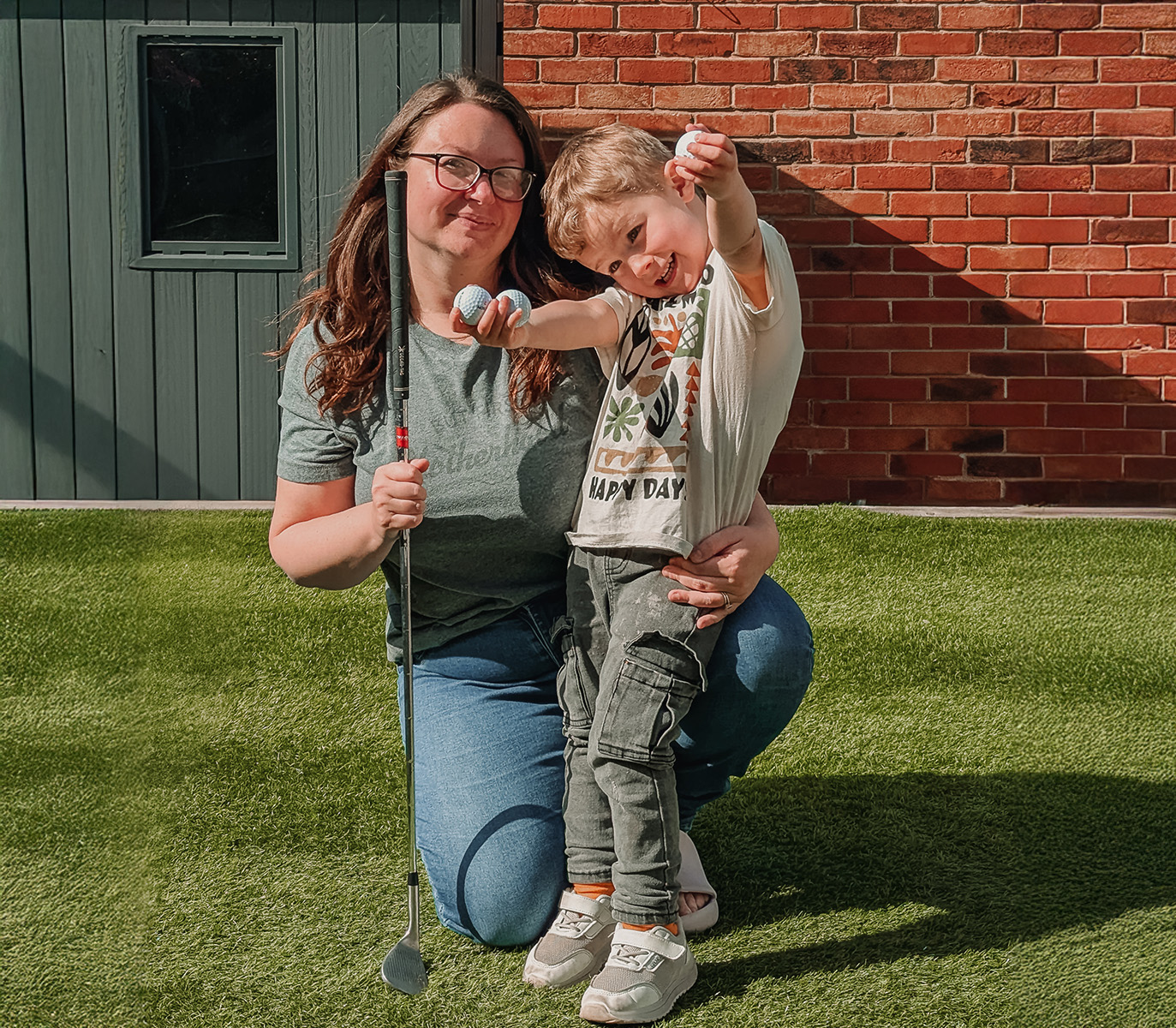It turns out golf isn’t just the stomping ground of silver-haired retirees wearing tartan trousers and shouting “fore” like it’s still 1982.
According to new research from England Golf, nearly 9 in 10 Britons (87%) still reckon the sport is the sole domain of the over-40s. But the tide is shifting—and fast. Just in time for ‘Get Into Golf Week’ (24–31 May), England Golf is teeing up a new kind of story: one of healing, mindfulness, and a four-year-old with a plastic putter.
Meet Lanie from Devon—a working mother who’s quietly rewriting what golf can mean. Her introduction to the sport wasn’t through tradition or television, but through a recovery journey that began in a hospital ward in 2017.
After undergoing surgery to remove a borderline serous tumour and her left ovary, she made a promise: to embrace life, movement, and every chance to try something new. Golf, of all things, was high on the list.
“After my surgery, I made a promise to myself to embrace activities I’d always wanted to try without letting my body hold me back,” Lanie says. “Golf was something I’d never seriously attempted, and it’s become unexpectedly therapeutic in my recovery journey.”
She discovered the sport through England Golf’s ‘Get Into Golf’ initiative—a five-week course led by PGA professionals. The structure, support, and flexibility made it possible for Lanie to balance life as a journalist, wife, and mother. Saturday morning sessions, while her husband looked after their son, became a sanctuary.
“I couldn’t attend weekday sessions due to work and childcare commitments, so I opted for Saturday sessions while my husband cared for our son,” she explains. “The five-week timeframe was perfect for learning the fundamentals while balancing my responsibilities.”
This wasn’t just hitting a few balls and calling it cardio. For Lanie, golf unlocked something deeper.
“There’s something incredibly calming and restorative about focusing on your swing and watching the ball soar,” she says. “It’s become a form of mindfulness that connects my physical and mental wellbeing.”
And she’s not alone in that sentiment. England Golf’s survey paints a broader picture of an appetite for golf among all ages—despite barriers.
Forty percent of respondents said they’d like to try golf just to socialise, while nearly a quarter (24%) recognised it as solid exercise, and 19% flagged its potential for stress relief.
So, what’s stopping them? The usual suspects: 38% say it’s too expensive, 11% bemoan poor access, and 4% still think it’s “too manly” (though they’ve clearly never seen Georgia Hall on a tear or Annika Sörenstam in her prime).
But interest is bubbling beneath the surface. Sixty-five percent of Brits have tried crazy golf, 51% mini golf, and 41% pitch and putt. Thirteen percent say they’d travel over 21 miles for a game—which, depending on your postcode and petrol prices, is practically heroic.
England Golf knows it needs to meet people where they are. “The good news for Britons is that these types of inclusive sessions already exist and are happening all across the country,” says Ben White, spokesperson for England Golf.
“From family-friendly taster events to women-focused coaching sessions, our clubs and facilities are actively working to make golf more accessible to everyone, regardless of age, gender, or background.
Get into Golf Week is just one example of how we’re opening doors to new players and showing them that this sport truly is for all.”
The research found that 46% of respondents think golf clubs should host family days to help children get an early start, 41% want schools involved, and 33% are calling for more women-focused sessions.
If you’re imagining a future where garden putting lessons replace tablets and tantrums, you’re not alone—Lanie’s already there, casually chipping in the backyard with her young son.
“I want to set an example for my son that health challenges don’t define what you can achieve,” she says. “Whether it’s golf or any other activity, I hope he sees that the options are limitless.”
And what started as a New Year’s whim has now become a part of her lifestyle. Having moved to Devon in 2021, Lanie’s embraced the outdoors with a vengeance—but golf is what stuck. Her spark came after interviewing pro golfer Gemma Dryburgh for SOCIALight, a magazine she produced focusing on women in sport. What followed was more than a swing of curiosity—it was the start of something lasting.
“Stories like Lanie’s perfectly illustrate why we organise ‘Get into Golf Week’,” says White. “Golf offers benefits that extend far beyond the physical, it can be genuinely therapeutic and life-changing for many people.”
Indeed, the benefits cited by the public include time outdoors (63%), better general health (46%), and more opportunities to socialise (39%). But the biggest reward might just be peace of mind—a quiet moment in the chaos.
England Golf’s ‘Get Into Golf Week’ isn’t just a clever campaign—it’s a genuine invitation. From discounted lessons to taster sessions at clubs across the country, it’s a week to open the door for everyone, not just the usual suspects with 18 handicap and six polo shirts.
Whether you’ve never held a club in your life or your putter’s been gathering dust since 2003, this might just be the nudge to start fresh.
For more details on local events and how to get swinging, visit www.getintogolf.co.uk/getintogolfweek.
Go on—get into golf. You might just find more than fairways and flagsticks. You might find yourself.





